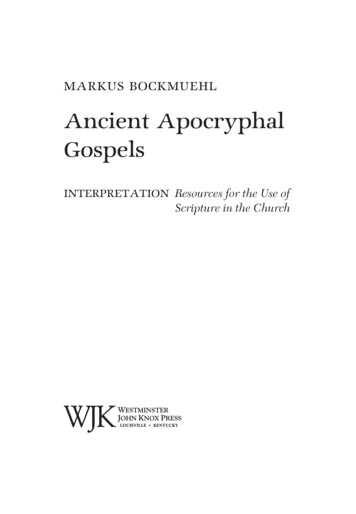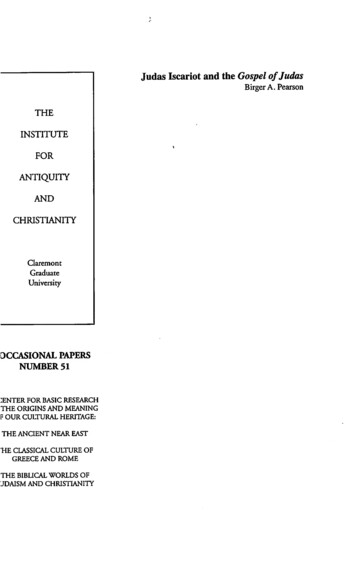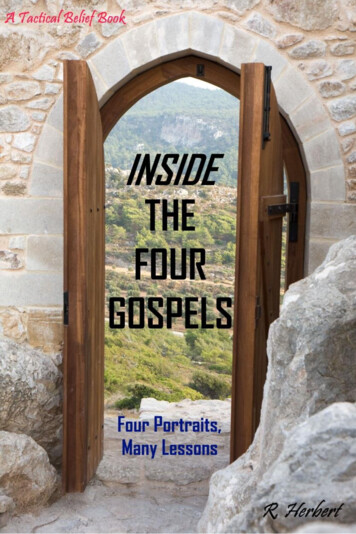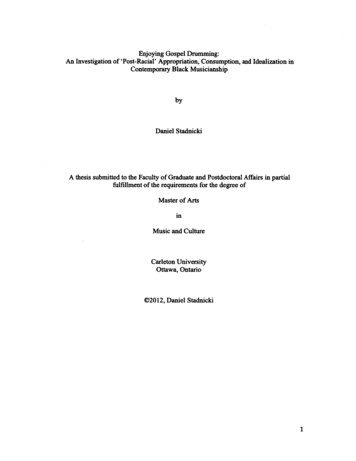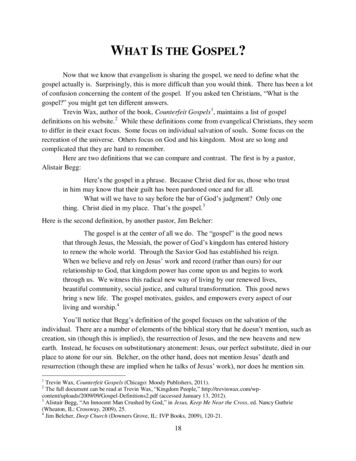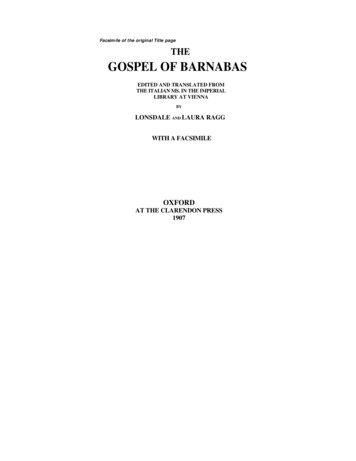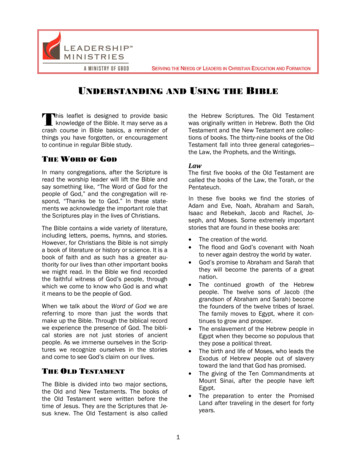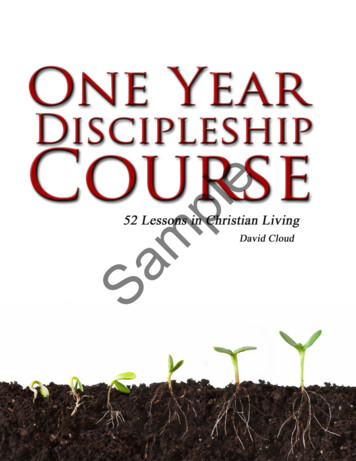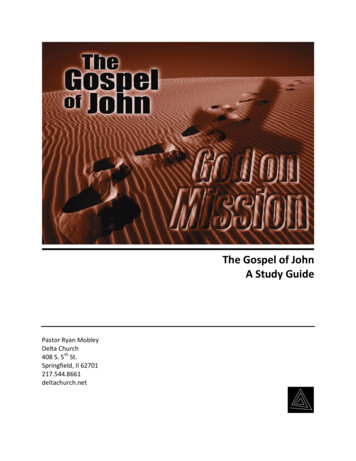
Transcription
The Gospel of JohnA Study GuidePastor Ryan MobleyDelta Church408 S. 5th St.Springfield, Il 62701217.544.8661deltachurch.net
IntroductionThe man and the gospel he wroteThere are no more controversial books in the bible than the 4 gospels; and the mostcontroversial is the Gospel According to John, the subject of this study. It is radically differentin its approach and its content of the life of Jesus than the others gospels of Matthew, Markand Luke (commonly called the ‘synoptic’ gospel, which literally means ‘seeing with the sameeyes’). John contains the most unique material and the most theologically dense material ofthe four gospels. It is also an intensely personal gospel, as we get a glimpse of Jesus the Godman much more intimately than the other three gospels.Like the other gospels, John was written anonymously and the attachment of John as theauthor comes from both internal and external evidence. Internal evidence for John’sauthorship is seen by: 1) personal witness of the events (John 19:35); 2) intimate knowledge ofJesus’ interactions with the disciples (John 6:5-7; 12:2-1; 13:3-6; 14:5,8,22); 3) insight into Jesus’thoughts (John 6:6,61,64; 18:4);4) the author being a Palestinian Jew who had first-handknowledge of Jerusalem and the surrounding country as described throughout the book; and 5)the closing of the gospel telling of the interaction of Jesus with “the disciple whom Jesus loved”(John 21:20). These internal evidences can point only to the inner circle of Jesus, namely, Peter,James, or John. Peter is ruled out because he is referred to constantly in the third person.James is ruled out because he was martyred prior to AD44 (Acts 12:2) which was well beforethe book was written (typically dated at AD85). So by process of elimination, we end up withJohn (known as “the evangelist”). External evidence also points to John’s authorship, as theearliest traditions of the church claimed John as the scribe. Iraneous bishop of Lyons (c. 180),Theophilus of Antioch (c. 165), Clement of Alexandria (c. 220), and the 4th Century historianEusebius all credited John as the author.We are first introduced to John in Mark 1:19 as Jesus is calling his first disciples. His father wasZebedee, and his brother James was also one of the first disciples. John is typically viewed as ayoung, gentle, maybe even effeminate man famously known for being the disciple that Jesusloved and leaning on Jesus, as mentioned in John 21:20. When in actuality, John and hisbrother James were a couple of testosterone-filled hotheads nicknamed the “Sons of Thunder”(Mark 3:17) who wanted to call fire down on a town that wouldn’t listen to Jesus (Luke 9:5156)! It would seem that John and his brother came by their personalities honestly, as it wastheir mother who asked Jesus if her sons could alongside Jesus (Matthew 20:20-28), and Johnand his brother were all for the idea.But we get the best picture of John as we read his writings. John penned a total of 5 books ofthe Bible: The Gospel According to John; 1, 2, and 3 John; and the book of Revelation. All ofthese books were written toward the end of John’s life. As mentioned earlier, his Gospel isgenerally believed to have been written around AD85, with his other writings following over thenext decade (Revelation is believed to have been written no later that AD96 while John was
imprisoned on the island of Patmos). In John’s writings, we still see his zeal and passion that hisnickname “Son of Thunder” would imply, but this passion has been redirected away fromcalling judgment down from heaven and ruling alongside Jesus to an intense love for Jesus andthe people of Jesus’ Church. We will see in John’s Gospel that he is a deep theologian, but thathis theology is fueled by a deep love for his Savior and Lord. This is a great example to us, asPaul encourages us in 1 Corinthians 13 to let love be the motivator for everything we do, lest allour words, knowledge, and theology be a noisy, clanging cymbal.The Gospel of John can be broken down into 4 simple parts: 1) The Prologue (1:1-18); 2) Jesus’Ministry (1:19-11:57); 3) The Passion Week (12:1-20:29); and 4) The Epilogue (20:30-21:25).Additionally, we see John making a pretty big deal about the number “7”. The number 7 istraditionally viewed as a number of completeness or perfection. In the Gospel of John, thereare 2 main sets of “7” to pay attention to: Jesus’ 7 Miracles (2:1-12; 4:43-54; 5:1-47; 6:1-15;6:16-21; 9:1-41; and 11:1-57) and Jesus’ 7 “I Am” Statements (6:35,51; 8:12; 10:7,9; 10:11,14;11:25; 14:6; and 15:1). Keeping these general breakdowns of John’s Gospel in mind will helpyour reading and studying of The Gospel of John.John’s purpose in writing this Gospel is made very clear in John 20:31 “but these are written sothat you may believe that Jesus is the Christ, the Son of God, and that by believing you may havelife in his name.” John’s desire was to see people come to faith in Jesus, and that those who aresaved will live a full life as God intended (cf. John 10:10). It is imperative to understand thatbeing a Christ-follower is much more than some decision or understanding of biblical principles,but that being a Christ-follower is about a joy-filled life we live that is saturated with theworship of Jesus and service to others.How to use this study guideThis study guide is designed to be a complementary learning tool that will correspond to thesermon series “God on Mission: The Gospel of John”. You may choose to use this study guidefor your personal devotion time or as part of your study and discussion for your communitygroup experience, or both! Since it is designed to complement the sermon series, it is highlyencouraged that you listen to the sermons, take notes, and incorporate them into this study. Ifyou miss any sermons on a Sunday morning, you will be able to download the audio from theDelta Church website (www.deltachurch.net). Each study in this guide will be broken down asfollows: An overview of the passage, giving you a broad brushstroke of what’s beingcommunicated The key text (verse) of the particular passage that is encouraged to be memorized thatweek The primary theological emphasis of the passage; basically, what the passage is teachingus about God
3-4 questions to think about and interact with A key missional emphasis on how to live, serve, and share the Gospel with others A prayer emphasis that will encourage your adoration, confession, or supplication toJesus and remember, prayer is about talking and listening to God!It is my prayer that this study guide will be a blessing to you both personally and corporately. Ilook forward to diving headfirst into The Gospel of John with you to take a good long look atthe life of Jesus and discover how we can deepen our belief and love for our great Savior &Leader. If at any time you have a question or a thought, please don’t hesitate to contact me sowe can learn together!Grace Peace to you on your journey,Pastor h.net
Study #1 – Mission: Incarnation John 1:1-18OverviewThe first 18 verses of John are some of the most glorious verses in all of scripture! We couldspend the rest of our lives on these verses; they are so rich and deep. The main thrust of thispassage is to show the eternal greatness of Jesus. There are obvious parallels with Genesis 1both in the phrase “In the beginning” (Genesis 1:1 and John 1:1). John immediately paints forus a picture of the deity of Christ, showing him as equal with God the Father and as Creator.We also see both the transcendence and the imminence of God in this passage. Jesus is biggerthan we could ever imagine, yet he is closer than we could ever understand. It is a wonderfulcombination of glory and grace!We are also introduced to John the Baptizer, whom we will take a closer look at in the nextstudy. John the Baptizer was given the privilege as the herald, or forerunner, of Jesus whoclearly understood his position in relation to Christ (1:15).Generally, this passage can be broken up as follows: The Greatness of Christ (v. 1-3); theGreatness of Christ’s Light (v. 4-13); and the Greatness of Christ’s Grace (v. 14-18). It’s all aboutHis Greatness!Key Text to MemorizeJohn 1:14 “And the Word became flesh and dwelt among us, and we have seen his glory, gloryas of the only Son from the Father, full of grace and truth.”Theology to knowLogos. “Logos” is Greek for ‘Word’; here referring to Jesus himself. There are three mainthrusts in Jesus as the ‘Word’: 1) John 1:1-3 shows Jesus as eternal, as Creator, and as equalwith God; 2) “Logos” implies that there is a message to be shared (namely the Gospel of Jesus);and 3) given John’s frequent quotes and allusions to the Old Testament (which we’ll begin tosee) he ties in the previous two thrusts as God created through his word (Genesis 1:3ff) andspoke to and through his Prophets (Isaiah 7:3; Jeremiah 1:4); Ezekiel 1:6) by his word (Hebrew,dabar).Zoe. “Zoe” is Greek for ‘Life’. This is also a key factor for the Fourth Gospel. We see Jesus living– he walks, talks, gets frustrated & angry, cries, mourns, etc. And as Jesus came to live the lifethat God desires and empowers us to do through His Spirit, we see that being a Christ-followeris much more about the lifestyle we live rather than a decision we make or belief we say wehave (cf. John 20:31 & James 1:22; 2:20).
Incarnation. Christianity is unique because it is the only religion where our God came downfrom heaven to embody himself as man (John 1:14; Philippians 2:1-11). Because of Jesus wasnot born of man (he had no earthly father), Jesus was born without a sin nature, which ispassed on through the father (Romans 5:12) and was therefore the only One able to be theunblemished sacrificial Lamb who could take away our sin (John 1:29).Questions to think about and discuss1. What are the practical implications of Jesus being the “Word”? How does this affectone’s view on creation?2. Do you view your Christianity as a decision that you made at some point in yourpast, or as a way of living? What does this understanding of being a Christ-followermean to you?3. John 1:12 makes a point in saying we “receive” Jesus. How does this differ from thecommon term of “accepting” Jesus as Savior?4. Why is the incarnation so important?5. What is the best way to truly get to know the character of God (see John 1:18)?Living on MissionThe ‘Word’ is to be both verbally shared and practically lived out. Who are some people thatGod has put in your life to speak and live the Gospel to?Prayer EmphasisMeditate on John 1:16. Reflect on all the ways Jesus has shown you grace. Praise him for beingthe Eternal God who came to earth and has shown you tremendous grace!
Study #2 – Mission: Prepare John 1:19-34OverviewWe are introduced to John the Baptist in this passage. A more appropriate title for John wouldbe “The Baptizer” instead of “Baptist” (there were no denominations then!). John was arelative of Jesus, perhaps his cousin, as John’s mother Elizabeth and Jesus’ mother Mary wererelated (Luke 1:5-45). John was chosen by God to be the first prophet Israel had seen in 400years whose call was to prepare Israel for the coming of the Messiah (Luke 1:16-17; John 1:23).John was very clear in knowing and proclaiming that he was not the Christ, but only theforerunner of the Christ. As bold as John was in his message, he was a very humble man beforethe Lord. It was this balanced mix of calling, self-awareness, boldness, and humbleness that ledJesus to dub John the greatest man ever born (Luke 7:28).We are also introduced to some key groups of people. First, we meet the Jews. In this passage,it is practical to think that John’s use of the term “Jews” is not referring to the entire peoplegroup, but rather the religious establishment in Jerusalem – either the Sanhedrin (70 ‘elders’who acted as a kind of Supreme Court in Jerusalem, with the high priest being an ex officomember that sat in a presidential-type of position) or perhaps the temple authorities.Secondly, we meet the priests and Levites. Their primary concern was theological purity andthe administration of the rituals and service of the temple. Lastly, in verse 24, we meet thePharisees. The Pharisees were a religious class that rose to power during the “400 Silent Years”from the time of Malachi until the time of John the Baptizer. They were strict traditionalistswho found pleasure in making sure every letter of the Law was followed, valuing outwardreligiosity over honest faith. It was the Pharisees that Jesus would speak most vehementlyagainst (Matthew 15:1-9; Matthew 23).Although John 1:29-34 doesn’t go into detail about Jesus’ baptism, we see from looking at theother Gospel accounts that this was the time when Jesus was baptized (Matthew 3:13-17; Mark1:9-11; Luke 3:21-22). Until this time, it was unknown to John who the Messiah was (eventhough Jesus was his relative!). When Jesus was baptized with water by John, the Holy Spiritcame to rest on Jesus in the form of a dove, revealing to John that Jesus was indeed theMessiah. John baptized people with water as a sign of repentance, but it is Jesus who baptizespeople with the Holy Spirit at their conversion (Ephesians 1:13; Ephesians 4:4-7; John 15:26).Key Text to MemorizeJohn 1:29 ‘The next day he (John) saw Jesus coming toward him, and said, “Behold, the Lamb ofGod, who takes away the sin of the world!”’
Theology to knowBaptism. “Baptizo” (Greek) means to “dip in or plunge under the water”. Baptism is asacrament of the church that identifies those who are Christ-followers. Baptism is not a savingact (one is saved by grace through faith-Ephesians 2:8,9), but it is an act of obedience to Jesus(Matthew 28:19) and an act of identification with Jesus, as He Himself was baptized (Mark 1:911). Baptism should follow one’s belief in Jesus as Lord and Savior (Mark 16:16; Acts 2:36-38).Lamb of God. In the Old Testament, the sacrifice of a lamb to take away sin is seen frequently(e.g., Genesis 4:4, 8:20, 22:2-8; Exodus 12:21-27). Jesus being the “Lamb of God” is seen fourtimes in the New Testament (John 1:29, 36; Acts 8:32; 1 Peter 1:19). In these passages, it isJesus’ sacrificial character that is referred to. While in the book of Revelation, Jesus ispresented as “Lamb”, but now it is a triumphal title, memorializing the completion of hissacrificial work. Jesus was the only perfect Lamb that could permanently atone for our sin onceand for all.Questions to think about and discuss1. John had a clear understanding of who he was and what his purpose was. Do you havethat kind of clarity in your life? What are some issues or events that caused youconfusion or have given you clarity?2. In verses 19-34, John’s eyes are suddenly opened to Jesus as the Messiah, the Lamb ofGod who takes away sin. Tell about when your eyes were opened to Jesus as yourMessiah.3. John’s purpose was to prepare people for the first coming of Jesus. How can youpersonally, and we as the church, prepare people for the second coming of Jesus?Living on MissionIf you haven’t been baptized already, follow Jesus’ example and obey his command and getbaptized! As you live the Gospel out to those who do not yet know Jesus, proclaim Jesus as theLamb of God, the only one who can take away sin and reconnect people to God the Father.Prayer EmphasisMeditate on John 1:29. Confess to Jesus sins that you are committing, receive the forgivenessthat he has given you, and thank him for taking away your sin!
Study #3 – Mission: Disciples John 1:35-51OverviewHere we meet Jesus’ first disciples: Andrew, Simon Peter, Philip, and Nathanael. John, theEvangelist who wrote the gospel, may also be included in this group, as the second disciple ofJohn the Baptizer who wasn’t named (1:35, 40). We can come to this conclusion based on tworeasons: 1) John often doesn’t refer to himself by name in his writings, and 2) the authorpossesses intimate knowledge of the calling of Jesus’ first disciples. “Disciple” literally means‘pupil’ or ‘learner’; and in the case of New Testament disciples, learners of a Rabbi (‘Master’ or‘Teacher’). The goal of a disciple is to learn to become just like his Rabbi in every way possible.So being a disciple was an intense commitment to a lifestyle, not just a static, classroomlearning environment. Another interesting note here is that Jesus’ first disciples were alreadydisciples of John the Baptizer. Not only was John preparing the people in general for thecoming of the Christ, but apparently preparing the disciples of the Christ!This section is the first apparent contradiction with the Synoptic Gospels (Matthew, Mark, andLuke). In the Synoptics, Jesus is shown walking along the shore and ‘calling’ his disciples to befishers of men (Matthew 4:18-22; Mark 1:16-20; Luke 5:1-11). Were there two callings? Not atall. In John’s account, Jesus doesn’t do any calling at all (except perhaps with Philip). The menhear John the Baptizer’s pronouncement of who Jesus is and then follow on their own. Jesusthen asks the potential disciples a question regarding their motives for desiring to follow him(‘What are you seeking?’) and then makes a series of statements: one of hospitality (‘come andsee’ where he is staying), one of renaming Simon (with a nickname that either illustrated hispersonality or his thick-headedness!), one of complimenting Nathanael’s character (1:47), andthen a couple comments that gave these potential disciples a glimpse into Jesus’ deity (1:5051). It is important to note here that John 2:1 (which we’ll study next) says “one the third day”;meaning, the third day after the interaction with Nathanael. It is very conceivable that theaccounts of Jesus ‘calling’ his first disciples as written in the Synoptics happened during thosecouple of days between Jesus’ conversation with Nathanael and the wedding at Cana, whereJesus is pictured with his disciples (2:2).Key Text to MemorizeJohn 1:49 ‘Nathanael answered him, “Rabbi, you are the Son of God! You are the King ofIsrael!.”’Theology to knowSon of Man. John 1:51 introduces us to a term that occurs 13 times in the Fourth Gospel: Son ofMan. It is a curious title that Jesus uses primarily in reference to himself. It is not as politicallypacked as “King of Israel”, nor is it overly religious as “Lamb of God”, “Son of God”, or“Messiah.” It echoes of Daniel 7:13-14 where God (entitled “Ancient of Days”) gives “one like a
son of man” dominion and power in an eschatological fashion. The beauty of this title for Jesusis that it indeed does marry both his humanity and his divinity, and since Jesus uses the termprimarily, he is the one controlling the context in which it is used, demonstrating his authority.Lastly, the verse in which this title is used is one that Jesus is illustrating his divinity andcommunication with the Father, thus emphasizes Jesus’ incarnation (John 1:14).Questions to think about and discuss1. Recall when you first became a disciple of Jesus. Did someone point you to Jesus, orwas there a more direct link of Jesus ‘calling’ you?2. Do you view your discipleship primarily as a lifestyle pattern or as a structured learningtime? What are the pros and cons of each viewpoint?3. In dealing with these first disciples, Jesus quickly addresses heart issues of theirmotivation for following him (1:38) and their character (1:42, 47). How do you value theissues of character and knowledge in your discipleship? Is one more important that theother?4. Nathanael was quick to judge Jesus based on where he was from (1:46). Are therepeople in your life (family, coworkers, neighbors, classmates, etc.) that you write off asnever becoming a disciple of Jesus? Where is your prejudice coming from?Living on MissionDiscipleship is a lifestyle, not simply acquiring knowledge. Refocus your lifestyle around beinglike Jesus. Find someone to help guide you in your journey, and then find someone to that youcan help guide as well!Prayer Emphasis“Jesus, help me surrender everything to follow you.”
Study #4 – Mission: Wine John 2:1-11OverviewThere are few events more enjoyable than a good wedding. And in 1st Century Palestine,weddings were a big deal. There would be a big feast, the wedding ceremony, a big paradethrough town, and then a week-long open house/party for the couple instead of them going ona honeymoon. One thing’s for sure: the Jewish culture is a party culture! Because this was sucha big deal, showing tremendous hospitality to the wedding guests was imperative. Manypeople during this time and in this area (Cana in Galilee) were poor, and this was the biggestevent perhaps in their lives. So running out of wine, which in the Jewish culture was a symbolof joy (Psalm 104:15; Isaiah 55:1), was a massive embarrassment!Jesus, his disciples, and his mother were all present at this wedding, which probably meant thatit was a family member or close friend of their family who was getting married. Jesus’ mother, Ibelieve out of concern for the couple, brings the issue of being out of wine to Jesus, knowingthat he was able to rectify the situation. Given the wedding environment, Jesus’ response ispacked with theological meaning. Saying that “My hour has not yet come” is a reference to hisown wedding feast (Revelation 19); it is the groom who was responsible for his own weddingduring this time, and Jesus is saying that this wedding isn’t his responsibility, but his time iscoming!But here we see the great compassion of Jesus. His first miracle was not something grandioselike feeding thousands of people from a sack lunch or raising someone from the dead. His firstmiracle was only really noticed by a few people, and it was done to save tremendous socialembarrassment. And it is worthy to note here that Jesus made somewhere in theneighborhood of 120-180 gallons of good wine, not the cheap stuff that’s served onceeverybody’s already more than a little tipsy (2:10).This was first time Jesus “manifested His glory” – through a quiet act of compassion thatbrought joy back to people.Key Text to MemorizeJohn 2:11 “This, the first of his signs, Jesus did at Cana in Galilee, and manifested his glory. Andhis disciples believed in him.”Theology to knowMiracle. Miracles are “signs and wonders” that occur with no natural explanation. They arebasically supernatural acts performed by a supernatural God that invade our natural, everydayworld. Since God exists above and beyond our world and is the author of our natural laws, andnot subject to them, God has the ability work above and beyond those laws, and to do so
through whomever he chooses (e.g., Moses, Elijah, the Apostles). Norman Geisler has said,“The only way to show that miracles are impossible is to disprove the existence of God.” Andthat has never been done.Questions to think about and discuss1. Since wine is a symbol of joy, and Jesus’ first miracle was to “restore joy” at thiswedding celebration, how would you rate your joy-level as a Christ-follower? What takeyour joy away? What restores your joy?2. Describe a time when someone showed you a quiet act of compassion that gave you aglimpse into the reality of God’s glory.3. Have you experienced a miracle in your life? What happened? Do you need a miracle inyour life today? What do you need that only God can provide?4. In light of John 2:11, how important is the presence of the miraculous for you to believein Jesus?Living on MissionLook for ways that you can show quiet acts of compassion to people this week (help someonewith household/yard chores, babysit, buy a stranger’s lunch, bus your own table at a restaurant,pick up trash at a public place, etc.).Prayer EmphasisThank God for the compassion that he showed you by bringing you into His family. Have faithand ask Him for a miracle that you need in your life (John 14:12-14; 16:22-24).
Study #5 – Mission: Clean House John 2:12-25OverviewAfter the wedding at Cana, Jesus went down to the city of Capernaum, which was “ministryheadquarters” for Jesus. John also makes mention of Jesus’ family in verse 12. Joseph is notmentioned after Jesus’ birth accounts, leading us to believe that he may have passed away bythis time in Jesus’ life. Also mentioned here are Jesus’ brothers, which Mark 6:3 expounds on(naming the brothers as well as mentioning sisters). Two of Jesus brothers became leaders inthe church and authors of New Testament books (James & Jude, respectively). Most likely,Jesus’ brothers and sisters were born to Joseph and Mary after Jesus’ birth, rather then beingcousins or children of Joseph’s prior to his marriage to Mary as some would argue.The next section vividly shows Jesus’ passion. The Synoptics have this event of cleansing thetemple occurring during the Passion Week, but there are enough details given in John’saccount, such as the intentional fashioning of a whip and his resurrection prophecy, to lead usto believe that this was a separate event. The fashioning of the whip is the most interestingpart of the story. Jesus didn’t just react; he intentionally plotted and prepared his response.The selling of animals for sacrifices was allowable in the temple courts, as it was a service tothose traveling who were unable to bring their offerings with them. The problem was thatthose who were selling were basically extorting the people by inflating prices and selling substandard animals.In response to a challenge from the Jews witnessing Jesus ‘cleaning house’, Jesus makes his firstrecorded prophecy regarding his own resurrection. This passage clues us into the literalnessthat the Jews expected of the Messiah. Jesus came to deliver people spiritually, not politically.So when he spoke of destroying ‘this temple’ (in reference to his body) they were oblivious tohis meaning.Jesus was very careful at this stage of his ministry to whom he revealed himself to, knowingthat man’s heart is a wicked thing apart from the Gospel. The misuse and abuse of the templein which he just cleared out and the denseness of the Jews he spoke with was evidence of that.But there were many who did believe in him based on the miracles he performed. But Jesusisn’t interested shallow faith that birthed from his miraculous signs, he is interested in genuinefaith that will stand up under the pressures of persecution and hardship (see Matthew 5:10-12).Key Text to MemorizeJohn 2:19 ‘Jesus answered them, “Destroy this temple, and in three days I will raise it up.”’
Theology to knowProphecy. Pastor Mark Driscoll of Mars Hill Church wrote the following thorough exegesis onthe gift of prophecy:There is great abuse of and confusion about the gift of prophecy. Much like the gifts of apostleship and pastor,there is both an office that is limited to a few people and a gifting and ministry that is open to many who receivethe spiritual gift of prophecy.In the Old Testament, the title “prophet” refers to the office of the person chosen by God to both hear from andcommunicate for Him (1 Samuel 3:20; 1 Kings 18:36; 2 Kings 6;12; Haggai 1:1; Zechariah 1:1). The prophetic callingcombined two ministries. First, prophets received specific revelation directly from God. Second, they spoke thatrevealed Word to the people God had called them to. The prophets were also painfully aware of the weightiness oftheir call since they consciously knew that they were the very mouth of Almighty God and spoke for God Himself.This is clearly seen in Moses (Exodus 4:12; 7:1-2), Isaiah (Isaiah 1:2), Jeremiah (Jeremiah 1:7), Amos (Amos 3:8;7:16), and Zechariah (Zechariah 7:12). According to the Old Testament scholar Gerhard von Rad, the phrase “theword of Yahweh” appears 241 times in the Old Testament, 221 in relation to a prophet.Additionally, Jesus (Matthew 7:15; 24:11, 24), Paul (Acts 20:29-31) and John(1 John 4:1) all promised that falseprophets would come. False prophets falsely claim to speak for god (1 Kings 22) and may also perform falsemiracles (Deuteronomy 13:1-3; 2 Thessalonians 2:9; Revelation 13:13-15).While no one single test for authentication of a prophet is appropriate, a few criteria help distinguish between trueand false prophets. A true prophet had outstanding moral character (Ezekiel 13:10-16), while false prophets didnot (Isaiah 28:7). The prophecy of a true prophet came true every time (Deuteronomy 18; Jeremiah 28; 1 Kings 22).False prophets were for hire and preached what they were paid to preach (Micah 3:11). False prophets prophesiedonly peace (Jeremiah 6:13-14; 8:10-11). The message of a false prophet conflicted with God’s prior revelation, ledto the worship of false gods, and was punishable by death (Deuteronomy 13). Perhaps the most thoroughdescriptions of false prophets are given in Deuteronomy 18:14-22 and Jeremiah 23: 9-40. Today, Christians canalso help to discern between true and false prophets by their inward testimony of the Spirit (Deuteronomy 18:1422; John 7:17).The Old Testament prophets were raised up by God along with the New Testament apostles to give us His Wordthat we now know as Scripture (Ephesians 2:20). Therefore, with the canon of Scripture now closed, the office ofprophet does not exist in our day as it did before the Scriptures were completed.There remains, however, the spiritual gift and ministry of prophecy. Like tongues, prophecy is also spoken of invarious ways throughout Scripture. Importantly, the New Testament does not elevate prophecy to the highest levelof authority as the Old Testament does. Each potential prophecy is supposed to be tested and approved by churchleaders such as the elders (1 Corinthians 14:29-32; 1 Thessalonians 5:19-22).1. In the broadest sense, prophecy is sometimes the teaching ministry of preaching the Bible as God’sWord in the church. Examples include 1 Corinthians 14:4 where prophecy “edify the church,” 14:6-7where Paul links prophecy and teaching, saying, “prophecy or word of instruction,” and 14:24-25where he explains that through the Spirit-enabled preaching of the Bible, non-Christians w
The man and the gospel he wrote There are no more controversial books in the bible than the 4 gospels; and the most controversial is the Gospel According to John, the subject of this study. It is
